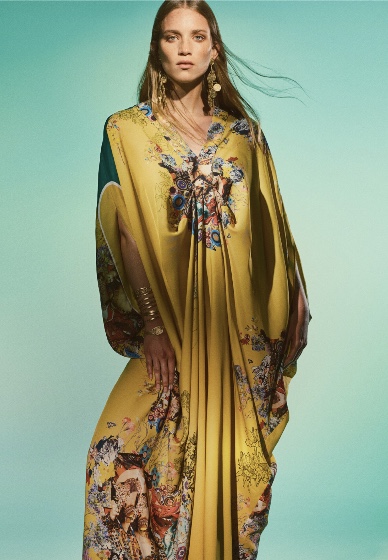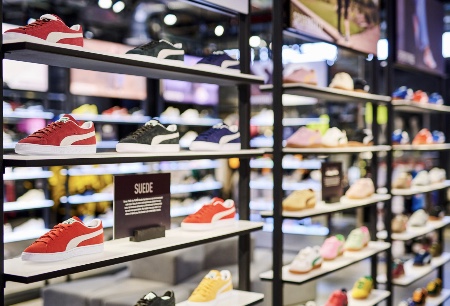BY COLLEEN KERN
The fashion industry, celebrated for its creativity, carries a large burden of responsibility for its impact on both people and the planet. Up to 10 % of global carbon emissions are caused by fashion, surpassing the combined output of all maritime and international flights. It’s a desperate industry, too, with a single cotton shirt guzzling the exact amount of water that one person drinks in 2.5 years. Our tendency to throw away is further exacerbated by the fact that 92 million tons of clothing are thrown away each year.
Beyond the economic toll, the social costs are equally alarming, rising from poverty wages to unsafe working conditions in global garment factories. To address these challenges, Remake, a non-profit organization, strives to transform fashion into a force for good. Their monthly Fashion Accountability Report provides a comprehensive analysis of how businesses have progressed in terms of cultural and environmental responsibility.
THE 2024 REMAKE FASHION ACCOUNTABILITY REPORT
A more thorough evaluation of the fashion industry has been developed for the 2024 Remake Fashion Accountability Report. The coverage of this year’s report has grown to 52 businesses with annual revenues of over$ 100 million, including a number of them.
fresh additions. The criteria have been tightened, and there is a focus on observable progress rather than hollow promises. The methodology has been improved.
With a possible total score of 150 points across six categories ( Traceability, Wages and Wellbeing, Commercial Practices, Raw Materials, Environmental Justice, and Governance ), the average company score was a mere 14 points– unchanged from the previous year despite mounting pressure for reform.
COMPANY PERFORMANCES
Leading the pack, Everlane claims the highest score with 40 points, followed closely by H&, M Group at 37 and PUMA at 36. Rounding out the top five are Reformation ( 34 points ) and Ralph Lauren ( 30 points ). Everlane, generally touted for its commitment to “radical transparency”, seems to be putting its money where its mouth is. The business shows improvement across all categories, with special emphasis on initiatives promoting traceability and economic justice. They have made substantial progress toward more green materials and have committed to obtaining the majority of their organic materials from renewable or helpful sources by 2025.
H&, M Group’s second-place ranking might raise eyebrows given past controversies, but the report acknowledges the company’s efforts, especially in emissions reduction and chemical management. The business has even begun investing in suppliers to help with the development of strategies to reduce emissions, which is a critical step in the direction of valuable climate action in the fashion sector.
At the other end of the spectrum, Fashion Nova, Forever 21, JCPenney, Missguided, SKIMS, and Temu all received zero points across all categories, indicating a total lack of transparency or observable progress on sustainability issues. Perhaps most disturbing is the presence of some apparently” green” brands near the bottom of the rankings. Rothy’s, known for its recovered plastic shoes, scored just 5 points. This small score highlights the disconnect between marketing claims and true, verifiable improvements in sustainability practices.
Savage X Fenty, Rihanna’s lingerie brand that has garnered praise for its inclusivity, managed only 4 points– and those only in the governance category.
This demonstrates the value of examining sustainability from a single point of view.
considering a brand’s total impact.  ,
Important Findings Overview
We’ve organized the report findings into three major categories:
- Social Impact: Just 2 out of 52 companies disclosed the percentage of garment workers receiving living wages, while 17 % revealed unionization rates in their factories.
- Climate/Sustainability Impacts: 71 % of companies now disclose their total annual carbon emissions, but only 8 % have set long-term Net Zero targets approved by the Science Based Targets initiative.
- Professional Procedures and Governance: Not a single business has developed a Buyer Code of Conduct to hold itself responsible for fair business practices.

DETAILED CATEGORY BREAKDOWNS
Social Impact: The People Cost of Fashion The report paints a concerning picture of the fashion industry’s approach to worker well-being. Just one company, Puma, stated it paid living wages to all primary employees worldwide. Some businesses make any visible efforts to promote unionization or provide adequate grievance procedures for employees.
The disconnect between rhetoric and reality highlights the need for fashion brands to prioritize and support their commitment to protecting workers ‘ rights and well-being.
Climate and Sustainability Impacts: Progress and Paradoxes
While awareness of climate impact is growing, material, science-based action remains uncommon. Water usage, a vital economic
factor in fashion production, remains generally opaque, with only three companies disclosing their entire water footprint. But, there’s a silver lining in chemical management, with 58 % of companies adopting a Manufacturing Restricted Substances List to reduce harmful chemicals.
The wildly popular notion of circularity in fashion has promise but lacks transformational impact. Resale and recycling initiatives are growing, but they have yet to substantially replace straight production models.
Business Practices and Governance: The Need for Accountability
Only 4 % of businesses considered responsible sourcing timelines when planning their orders, demonstrating how little ethical considerations are taken into account in core business operations. While 62 % of businesses release comprehensive Tier 1 supplier lists, transparency suffers even more down the supply chain.
The report also highlights a concerning lack of progress in diversity, equity, and inclusion efforts. Most businesses fail to provide thorough information about how to hire and promote members of underserved groups.
THE ROAD AHEAD
It’s important to note that Remake’s report is n’t intended to be a shopping guide, it’s a call for fundamental industry transformation. The organization places a lot of emphasis on a few important areas for change:
• legally bound agreements that hold accountable throughout supply chains.
• Individualized decarbonization initiatives for each production region.
• a transition from practices of the overproduction to those of the genuine round economy.
• Putting a really transition that emphasizes the voices of the workers at heart first.
Despite the challenges, some favorable trends emerge. Companies like Burberry, Cotopaxi, and H&, M Group are expanding repair services, while Everlane and Reformation show progress in adopting more green materials. In governance, five companies – Inditex, Kering, Nike, PUMA, and Ralph Lauren – have begun tying professional bonuses to cultural and economic metrics.  ,
CALL TO ACTION – HOW TO HELP
Remake’s message extends beyond industry insiders to consumers:” Continue to learn, share and act! Use your voice to encourage improvement in businesses! Participate in campaigns and vote for policies that protect worker communities, animal rights and the environment. Consider each purchase a longer term investment”.
But how can consumers actually implement this call to action? Remake offers many avenues for engagement:
- Join Remake’s campaigns: Visit their Campaigns Page to support initiatives like the FABRIC Act, which aims to improve working conditions in the U. S. garment industry.
- By educating your local area about sustainable fashion practices, you can take the lead in the# WearYourValuesMovement.
- Demand legislation that requires fashion companies to be held responsible for their social and environmental impacts.
- Use social media appropriately: Follow @remakeourworld on TikTok and Instagram to stay informed and share important sustainability-related news with your network.
- Support Remake’s work: Consider donating to fund their research, advocacy, and academic initiatives.

As we navigate the complex landscape of fashion and sustainability, reports like Remake’s serve as essential guideposts. They serve as reminders that the transformation of the fashion industry necessitates more than informed shopping; it also calls for engaged citizenship, policy advocacy, and a willingness to reimagine the whole fashion ecosystem. Although the road ahead is huge, organizations like Remake are panning the way for a more ethical and sustainable future for fashion. By taking action, every one of us can play a part in this critical transformation.  ,
The entire report can be found at www. remake. world / accountability-report-2024.


